Global Challenges: Formative Trends
Pnina Sharvit Baruch, Ariel Sobelman, Liran Antebi, Shira Efron, David Siman-Tov
Global Challenges: Formative Trends
Pnina Sharvit Baruch, Ariel Sobelman, Liran Antebi, Shira Efron, David Siman-Tov
Like all countries, Israel is influenced by the global geopolitical reality. In this reality, contrasting ideas and values play an important role, as they shape the interests and conduct of respective actors in the international arena. Leading conceptual and ideological polarities include liberal and democratic values vs. illiberal worldviews, support for globalization or isolation, and more. Thus, analysis must go beyond identifying the interests of international actors to also address the values they adhere to. Conduct in the international arena involves various tools, such as sanctions, boycotts, and legal channels, and an array of actors, which include international institutions and organizations and non-state organizations, joined in recent years by “private” non-state actors, such as multinational companies. The first part of this chapter addresses these aspects. Beyond understanding the realm of values and ideas, it is important to examine areas with broad ramifications for all countries of the world and for their positioning in the global arena, including the fight against climate change, technology, and the digital space. These are explored in the subsequent sections of this chapter. To promote its interests, the State of Israel must formulate policy in these fields, in accordance with the respective opportunities and challenges they entail.
The Importance of Remaining in the Camp of Democracies
Pnina Sharvit Baruch
Summary chart
Current Situation
Open investigation at the ICC · Request for ICJ advisory opinion · Condemnations and calls for boycotts
Current Israeli Strategy
No cooperation with international proceedings, but dialogue on professional basis · US assistance in curbing the campaign
Israel’s Strategic Gap
Difficulty in forming a persuasive legal response to the charges against it, in particular regarding part of the Palestinian claims · Rhetoric and activity in Israel’s internal arena used against it in the international arena
Strategic Alternatives
- Respond to criticism, based on Israel’s being a law-abiding country Informal discourse with the ICC Prosecutor · Maintain US support
- Ignore the criticism Focus on attacking the critics · Shun elements involved in international campaign against Israel
- Cooperate with commissions of inquiry, the ICJ process, and the ICC Prosecutor
Recommended Strategy
Alternative 1, which is based on the existing policy, partially addresses threats – with US assistance – in the international legal campaign, especially in the criminal realm, as well as processes in the diplomatic arena
Recommended Action
Affirm officially that Israel respects international law · Retain and strengthen ties with the US, while maintaining a shared value system · Hold informal talks with the ICC Prosecutor to clarify Israel’s position · Maintain the independence of the judicial system in Israel · Continue to conduct investigations and prepare factual and legal analyses of irregular incidents
Organizing Concepts and Values
The conduct of states in the global arena is based on the idea that there is a binding framework of rules that regulates the relations among them. Russia’s invasion of Ukraine is deemed a gross violation of the rules of the game, in particular, the prohibition of using force and violating the territorial integrity of a sovereign state, and therefore it has evoked severe criticism. Significantly, Russia did not disavow the existence of rules, but rather provided (unconvincing) explanations of the legality of its action. As a result, while the Russian course of action undermines the accepted global order, it does not represent a complete collapse of this order.
The war in Ukraine and the growing rivalry between the United States and China highlight the underlying competing values in the international arena. On one side are countries that share a liberal worldview, which is based on ideas of substantive democracy, respect for human rights, protection of individual freedoms, and the rule of law, including respect for international law. Leading this group is the United States, and alongside it are most European countries and other states that define themselves as Western and democratic countries, including Australia, Japan, and South Korea. On the other side are countries that maintain authoritarian regimes that deny individual liberties, disregard human rights, and shun submission to the rule of law, internal or external. The most important of these are China and Russia, and alongside them are countries such as Iran. These countries challenge the liberal world order, even if they accept and cooperate with some of the rules of the game.
The division of the world into camps is not new, but in the past year the contours were defined much more clearly. Countries that support liberal and democratic values have begun to regroup to prevent dependence on countries that do not share these values, while tightening the relations between them and the frameworks for joint activity. The respective strategic objectives of China and the United States portend the return of economic alliances based on interests and the weakening of a global economy based on market forces. Technological strategy based on collaborations with “like-minded states” returns bipolarity to the headlines and restores the need for the world’s countries to prepare accordingly. Given this trend, countries could well be required to choose sides and refrain from a policy of straddling the fence.
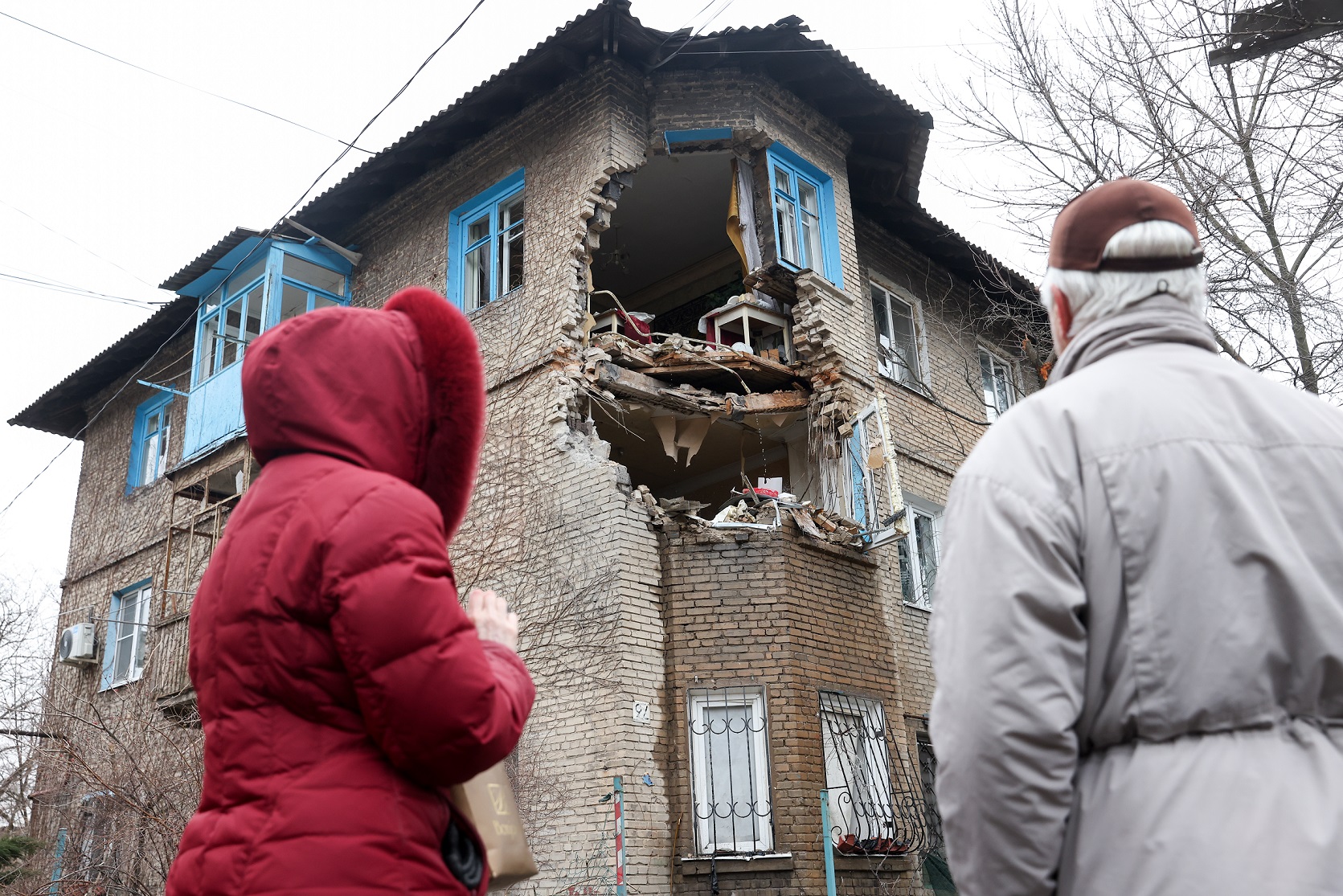
The war in Ukraine highlights the underlying competing values in the international arena. Ukrainian citizens eye their home, damaged in a Russian attack
Photo: Alexander Ryumin/TASS
As a result, values-based considerations – especially the protection of democracy and liberal values – gain additional urgency and are important for maintaining Israel’s standing in the international arena as well as its close relations with its allies, first and foremost the United States. This is particularly true to the extent that the division into camps in the international arena continues, and with it, the expectations of clearer values-based partnership as a condition for joining and belonging to the group. Israel sees itself, and is also seen externally, as among the democratic and Western countries. Nevertheless, there is a trend in Israel that seeks to curtail to what degree democratic and liberal values are upheld, and this compounds the ongoing challenge posed by the reality in the Palestinian theater. If Israel distances itself from the democratic and liberal worldview, this could undermine its deep connections with the United States and challenge its inclusion in the developing alliances among the countries with this set of values.
Tools in the International Arena
The year 2022 was characterized by a recourse to stronger sanctions against violators of the world order, chiefly Russia and Iran, as well as extensive restrictions imposed on China. Sanctions are not a new tool, but the sanctions imposed on Russia are apparently the most extensive that have ever been imposed. It also became clear that countries were willing to pay a price in order to punish Russia, as manifested mainly in the energy sector.
Another phenomenon inspired by the war in Ukraine is a significant increase in support for the International Criminal Court (ICC). The new Prosecutor, who was appointed in June 2021, improved the Court’s relations with the United States, after he relieved it of investigating its personnel in Afghanistan, and enlisted many countries that expressed open and active support for his vigorous activity surrounding the war crimes in the conflict in Ukraine. Thus, the Prosecutor ordered the dispatch of the most extensive investigation team to Ukraine as well as the precedent-setting step of the Office of the Prosecutor joining additional countries, including Ukraine and Poland, in an investigative team to support the investigations and proceedings underway in the countries themselves.
For years Israel has faced a campaign in the international arena, evidenced by the large number of decisions against it at UN institutions, the commissions of inquiry about its activity, and the criminal investigation at the ICC that has been open since March 2021. Yet the coming year is expected to be especially challenging, given the UN General Assembly resolution from December 30, 2022, which requests an advisory opinion from the International Court of Justice (ICJ) in The Hague regarding the legal consequences arising from Israel’s ongoing violation of the Palestinian people’s right to self-determination, the prolonged occupation, the settlements, and annexation, including measures aimed at changing the demographic composition and the character and status of Jerusalem, and the adoption of discriminatory legislation and measures in this context. This joins the increasing pressure on the ICC Prosecutor to move forward with the investigation regarding Israel. Meanwhile, accusations of Israel maintaining an apartheid regime are gaining momentum, although it is doubtful that Israel will soon find itself under significant boycotts or sanctions. Nevertheless, the adoption of a confrontational policy that clearly deviates from accepted international norms, such as an explicit act of annexation in the West Bank or large-scale measures of collective punishment of Palestinians, could eventually lead to such steps against Israel, both by official bodies and by global companies.
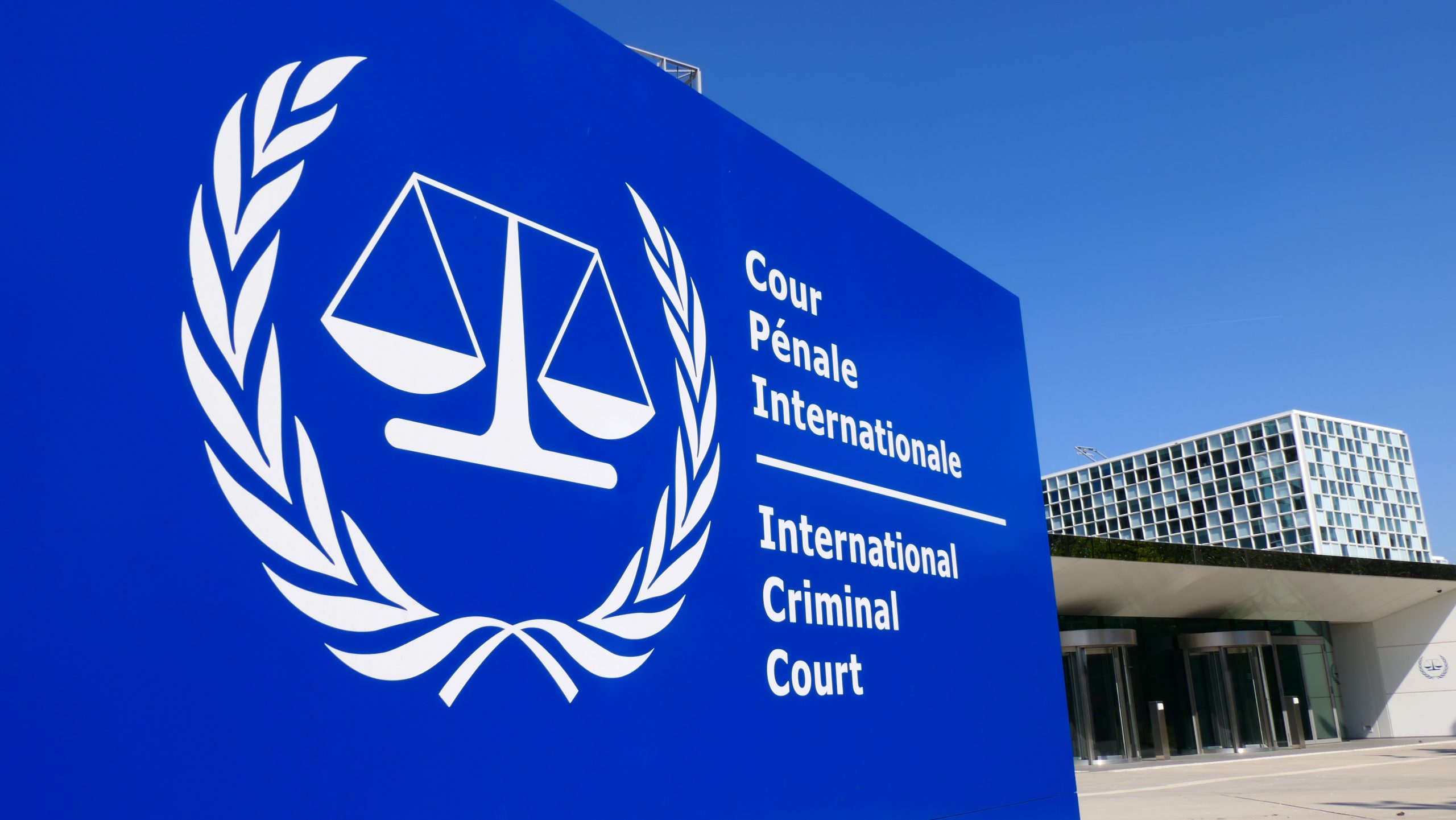
A criminal investigation against Israel at the ICC that has been open since March 2021. The International Criminal Court in the Hague
Photo: Shutterstock
Actors in the International Arena
The year 2022 has seen a clear weakening of the UN Security Council as a body that is able to intervene effectively in the international arena, given the renewed formation of separate camps – liberal democratic countries vs. illiberal countries. However, it is too early to discount the UN: all countries desire membership in this institution, and it continues to regulate important conduct in the global realm.
An important element that shapes the international order is the entry of new non-state actors into the global arena, led by giant global companies such as Google, Microsoft, and Amazon. These companies have economic power and influence exceeding that of most of the world’s countries, and they play an important role in the international arena. Thus, as part of the war in Ukraine, there has been a prominent and relatively new phenomenon of many foreign companies (over 1000) that decided on their own initiative to curtail their business in Russia or to stop it entirely, even when they were not required to do so as part of sanctions imposed by countries. While it is difficult to assess to what extent the decision stems from substantive values-based considerations or from public image considerations, the result is the same. The phenomenon of these companies adopting independent “foreign relations” is worth analyzing and monitoring, in particular given the risk that there might be an attempt in the future to direct such steps against Israel.
The Technology Arena: Time for Israel to Choose Sides in the Global Technology Competition
Ariel Sobelman and Liran Antebi
Summary chart
Current Situation
Leadership eroded in certain fields · Need to choose sides in the great power competition will be challenging
Current Israeli Strategy
Technology as an economic engine, means of leveraging foreign relations
Israel’s Strategic Gap
Lack of preparedness for a future demand to choose sides in the global technology competition, regarding chips or artificial intelligence
Strategic Alternatives
- Deepen cooperation with the US and the West, both in the field of chips and in artificial intelligence, including the required regulations Adapt trade with China to the regulations
- Maintain a free market while making an effort to maneuver regarding chips, artificial intelligence, and technology in general
Recommended Strategy
Side with the US in the chip war · Adopt Western regulation · Maximize opportunities in face of the hi-tech crisis
Recommended Action
Formulate a position on the global chip war and strengthen Israel’s place among Western countries regarding technology policy · Use the layoffs in hi-tech to recruit quality personnel for the security establishment, while considering support for relevant companies to prevent attrition
Israel ranks among the world’s leading countries in innovative cyber and other technologies, as well as research and development in various technological fields. Technology is at the core of the Israeli economy, and the links between Israel’s technological capabilities and its security and global standing underpin its national security concept. Nevertheless, an in-depth look at investments in Israel compared to other technologically advanced countries reveals that Israel encourages private investments and initiatives in the field of technology, especially in the field of software, but lacks a technology strategy guided by national priorities. Israel would do well to draft a national plan that integrates collaborations, initiatives, and investments that ensure its military, demographic, social, and economic resilience for future generations.
Israel and Technology in the International Arena
In recent decades, the technology realm has become a source of geopolitical power and a significant element shaping the changing world order – in some way similar to the influence of energy, particularly oil, which has figured prominently in geopolitical dynamics. While in the case of energy Israel coped with a geostrategic reality in which its enemies leveraged their energy resources and clout as part of their struggle against it, in technology, Israel plays a leading role as a supplier of technologies, a model of entrepreneurship, and a source of intellectual property, and stands at the forefront alongside the most advanced countries in the world. As such, we see a fundamental flip in the geostrategic balance where Israel is part of the powerful nations. However, with great power comes great responsibility, and developments in the international arena could undermine the existing reality – and therefore they demand proper preparedness.
A global technology war is underway, manifested, perhaps most prominently, in a clash between the United States and China and their competing technology strategies. The great powers vie with each other for global control of supply chains and seek to bolster their respective abilities to produce hardware independently. The strategy is reflected in major investments in local fabrication plants, particularly in the field of semiconductors. This is war, because behind it are not only economic interests but national-military tensions; the tools use include legislation, policy, sanctions, export controls, as well as unprecedented stimulus and industry incentive programs, as well as steps in the fields of education, internal affairs, labor, welfare, and foreign relations. The great powers understand that technology is not only a means but also an end, and a central influencer of their global standing. They explore how to associate in camps, generate coalitions and define global resources for the sake of “technological superiority” in their territory. It is, therefore, no coincidence that technology in our time is a central shaper of the emerging world order.
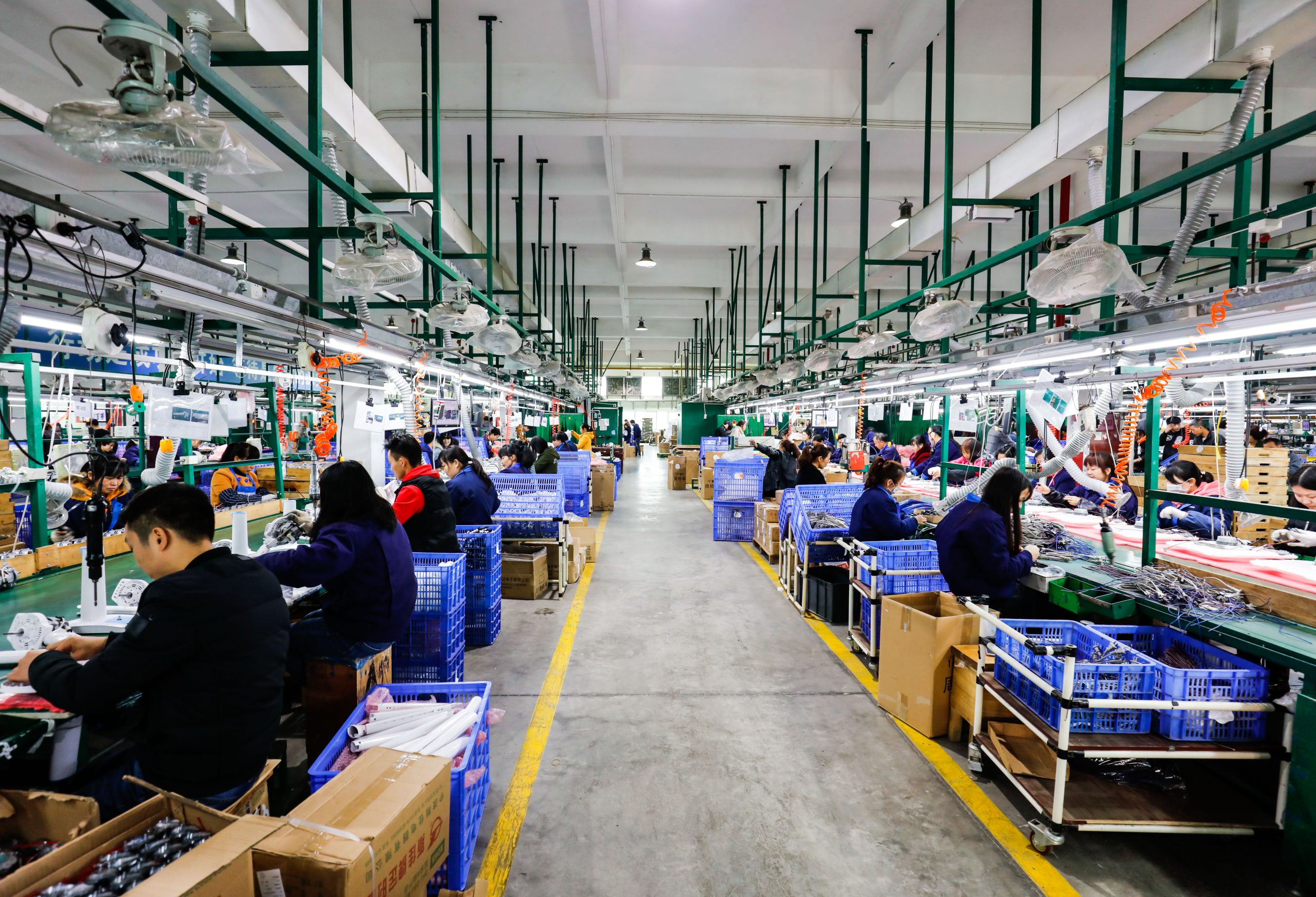
A global technology war is underway, manifested in a clash between the United States and China and their competing technology strategies. Electronics factory in eastern China.
Photo: Shutterstock
Israel’s economy is exposed to the struggle of the great powers, for example through Chinese investment in companies in Israel, business collaborations, and the transfer of Israeli technology and intellectual property to China. Illustration of the implications of this competition for Israel are evident in the struggle over technological leadership in the “chip war” of the past three years. A microchip is a technological component found in every electronic device, civilian or military, and it is the most expensive and complex component to produce ever invented in human history. Today, the majority of chip production takes place in Asia, but the United States and Israel are among the world leaders in designing them. The United States is waging a fierce struggle against China over control of the chip supply chain, while for its part, China aspires to independence in the chip field and is conducting a worldwide effort to amass Western technology, including from Israel.
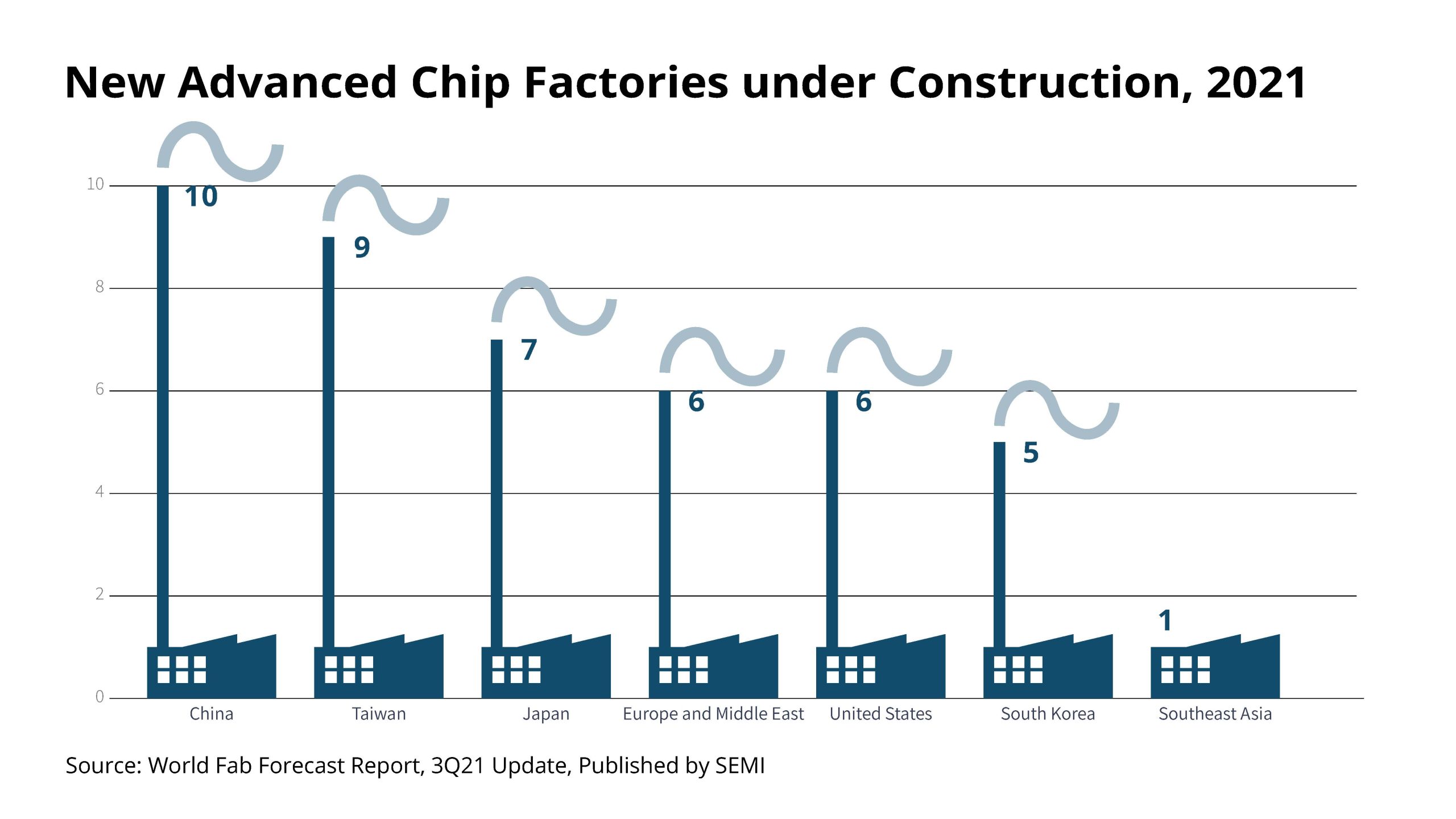
The United States aims to generate several global effects, chiefly reducing the dependence on Asian production and strengthening American control of the global technology supply chain. Furthermore, it has encouraged leading Asian companies to transfer their factories to its territory, including the Taiwanese company TSMC, the Korean company Samsung, and the American company Intel, which has cancelled plans for factories in China and is building them in the United States with funding from the CHIPS Act, which was passed in 2022. The United States is also trying to reduce the damage of a possible war in the Taiwan Strait, which would lead to severe disruption of the global economy in the case of damage to the semiconductor fabrication plants there. Further efforts include imposing serious restrictions on companies and countries cooperating with China’s attempts to acquire Western knowledge and technologies.
Intel, for example, via its fab and development centers in Israel, is the largest private employer in the economy. About 80 percent of the chips produced in its Kiryat Gat fabrication plant are exported to China to be embedded in consumer products, and they constitute about half the annual exports from Israel to China. An American directive that would affect Intel Israel’s sales would impact the economy and the livelihood of thousands of Israeli families. In the past year, US officials have relayed messages regarding the expectation that Israel take a stance and enact an unequivocal policy in the technological war, on the side of the United States. This has created tension between Israel’s economic needs and its conduct as an independent technology leader on the one hand, and the value of its relations with its most important and powerful ally – the United States – on the other hand.

Another important theater for cooperation between Israel and the United States is artificial intelligence. The race in this field has become significant in the international rivalry, as the superpowers develop and implement mechanisms designed to control the flow of knowledge and technology, and thus to protect their qualitative edge. This includes collaborations, export and supplier regime restrictions, domestic and international regulation through standardization, and monitoring of foreign investments.
Israel has a significant relative advantage in artificial intelligence, which rests on past and current investments that have enabled the growth of an ecosystem that combines industry, academia, and defense agencies. These drive the field forward through cooperation, knowledge, and human resources at a higher level than many countries in the world. Israel is also considered a leader when it comes to the development and implementation of defense applications based on artificial intelligence technologies.
In the past year, Israel’s ranking in the global artificial intelligence index rose from sixth place to fifth, in part due to an improvement of its ranking regarding government policy, in light of the publication of a national artificial intelligence plan and about 2 billion NIS of funding. The continued funding and national attention to this issue now lies with the new government. Moreover, alongside membership in the Global Partnership on Artificial Intelligence (GPAI), which Israel joined at the end of 2021, in 2022 the Ministry of Science and Technology published its draft policy document on the issue of regulation and ethics in the use of systems based on artificial intelligence. The document aims to serve as a moral and business compass for every company, organization, or government agency that is involved in the field or uses it.

Israel has a significant relative advantage in the field of artificial intelligence. An autonomous driving vehicle, produced by Mobileye and Intel, in Jerusalem
Photo: Shutterstock
Domestically, technology has an enormous impact on the Israeli economy. At the end of 2022 there was a certain decline in capital raised for the hi-tech industry alongside a rise in the number of layoffs, including in the major technology companies such as Facebook that have large development centers in Israel. As of late 2022, it was not yet clear whether this was a real shake-up, and many companies have continued to recruit employees. Nevertheless, it is expected that the interest rate will continue to rise and that capital investments will continue to decline, and therefore the number of layoffs in this central sector could increase. While this development could have negative impacts on the growth of new start-up companies in the short term, it is possible that this creates an opportunity for the security establishment and for the defense industries to recruit quality personnel and offset the traditional shortage.
Conclusion and Recommendations
The changes underway in the world demand that Israel rethink the future of the technology industry in Israel and ultimately draft a national plan that includes a broad technology strategy. Such a plan would be the product of cooperation among all relevant government ministries along with the leading industries in the private sector and would allow for rebalancing investments in light of the global changes and needs of the State of Israel.
Israel should consider the developing cooperation and align itself with the OECD countries, foremost among them the United States, on technology issues, in order to ensure that its international standing and economic interests are maintained. Israel will need to choose sides and direct its technological policy accordingly. In this respect, it will be necessary to characterize permitted fields of trade with China, fields that could be problematic, and other fields that should be prohibited. The government investment policy, in part by means of Israel Innovation Authority grants to Israeli companies, must also be examined in view of the struggle between the great powers.
Given the economic importance, it seems that Israel’s policy of incentivizing the industry through tax benefits will not be enough vis-à-vis the global competition. This is while the United States and European countries, as well as Japan, South Korea, and Taiwan, legislate laws to encourage their technology industries. The government of Israel should define a comprehensive national technology strategy and update it frequently. In the same context, Israel should encourage multinational companies to build, expand, and upgrade their chip and hardware facilities and Research and Development centers in Israel.
Israel should continue working to adjust standards to the leading GPAI countries: this is especially important given the fierce competition between China and the United States surrounding the issue and Israel’s future place in this context. Furthermore, Israel should approve the remaining budget (an additional $3 billion) for the national artificial intelligence plan, and work to implement it. Meanwhile, it is recommended that Israel approve and continue to advance the Ministry of Science’s policy draft on regulation and ethics for the development and use of systems based on artificial intelligence. All of these will help maintain and advance Israel’s standing in the field, both for the needs of its economy and for its immediate defense needs.
Israel is a leader in the field of cyber and software. Developments in the field of cyber, computing, and artificial intelligence have become a condition for Israel’s economic-military power and constitute a basis for partnership and for Israel’s strategic alliances around the world. However, investment in software is not enough, and Israel also needs to invest in the production of hardware, so that the elements that are critical to its national security will be independently produced or at least accessible.
Israel should also quickly formulate a policy for coping with the layoffs in the hi-tech industry, and examine the possibility of exploiting the situation for the purpose of engaging quality technology personnel in the defense establishment or the defense industries. At the same time, it should examine the need to temporarily support various technology companies in order to prevent a situation of an erosion of the Israeli hi-tech industry, which is both a source of attraction for many countries and a growth engine for the Israeli economy.
Turning the Climate Crisis into an Opportunity for Regional Cooperation
Shira Efron
Summary chart
Current Situation (Global)
Climate change a priority · The war in Ukraine is short-term setback in energy security but in the long term expedites development in food and energy security
Israeli Strategy
Reducing emissions, adapting to climate change, investing in climatech, and leveraging technological capabilities
Israel’s Strategic Gap
Some decisions not yet implemented, including climate law · Inadequate attention to risks and insufficient seizure of opportunities · Technological lead challenged · BDS campaign for climate justice
Strategic Alternatives
- Prioritize climate change issues over other national security threats and opportunities
- Reduce attention to climate change, given immediate threats and greater denial of climate change
- Implement government decisions and legislation, while prioritizing adaptation, higher investment in climatech, and diplomatic of leverage Israel’s climatech lead in the region and on the global stage
Recommended Strategy
Alternative 3, which calls for full implementation of the existing declared strategy · Align with OECD member countries, prepare for climate crisis risks, and maximize inherent diplomatic and economic opportunities
Recommended Action
Legislate a meaningful climate law and implement government decisions · Reduce barriers, invest seriously in sustainability R&D, and create incentives for climatech · Advance technological climate cooperation with Europe and US · Leverage technology lead for increased cooperation in the ME, including early warning, climate emergency response, R&D, and food and water security · Prepare diplomatically and legally for BDS campaign on climate justice
The physical manifestations of climate change include a steady rise in temperature, along with increases in aridity, droughts, sea level rise, and massive fires, and growing intensity and frequency of extreme weather events – heat waves on the one hand and unprecedented floods on the other hand. Over the past year, most areas of the globe were warmer than usual, including Western Europe, China, Iran, Nepal, Afghanistan, Pakistan, and Antarctica. In Pakistan, the high temperatures were accompanied by disastrous floods that affected 33 million people, led to the deaths of 1,700 individuals, destroyed 1.7 million homes, and caused an estimated $40 billion in damage. In addition to their direct effects, these climate trends heightened existing threats to water and food security, damaged critical infrastructure, exacerbated economic hardship, and created new threats to public health. In 2022, for the first time, an annual global survey among 4,500 risk assessment experts from 58 countries ranked the climate crisis as the main threat to the world’s security, greater than geopolitical tensions and wars, cyber, pandemics, and economic challenges.
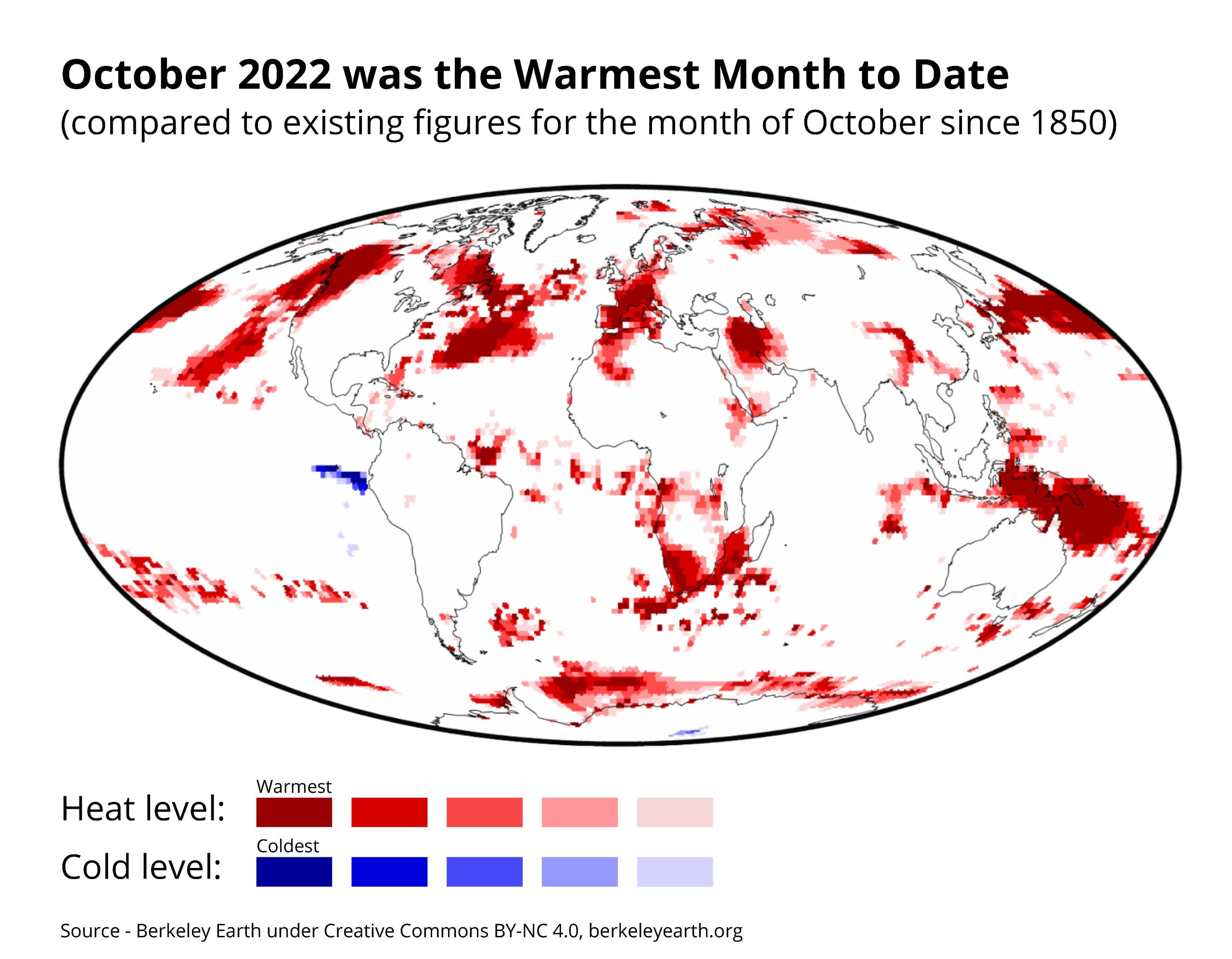
Climate Change Globally
The global focus on climate change was reflected in the unprecedented participation of almost 50,000 people in COP27, the UN climate conference, in Sharm el-Sheikh in November. Nonetheless, the conference was not considered a success, because it concluded without a meaningful statement on reducing fossil fuel use and without deepening commitments to limit the average temperate rise to 1.5 degrees above the pre-industrial era levels. The main achievement of COP27 was the agreement on loss and damage – the establishment of a fund to compensate developing countries for the harm they sustained by climate change, and the costs of recovery, although the details of the compensation mechanism are still unclear.
The conference took place against the backdrop of the war in Ukraine, which created a shortage of natural gas and led several countries in Europe to burn more fossil fuels, including coal. However, this is a short-term trend, and the war is in fact accelerating the transition to renewable energy, all in the name of achieving three interrelated objectives: energy security; an edge in the renewable energy industry, which is an engine for economic growth; and the fight against climate change. Illustrative in this regard is the investment of $370 billion by the United States and European investment of288 billion euros in the transition to renewable energy. In total, the global investment in green energy is expected to grow from $1.3 trillion in 2022 to over $2 trillion per year by 2030.
The transition to renewable energies is also underway in China, despite its ranking as the world’s number one greenhouse gas emitter. Although it did not deepen its commitments at COP27, in the months preceding the conference, Beijing announced several steps to limit greenhouse gas emissions in its most polluting sectors. China also resumed climate talks with the United States, after they were suspended following the visit to Taiwan by Speaker of the House of Representatives Nancy Pelosi in August 2022. In addition, China set a higher target for nuclear energy, which will further cement its leadership in the renewable energy industry: already today it already controls the global production chain, including mines, metals, and production materials for energy facilities and lithium-ion batteries for storage and for electric vehicles. Thus, while the fight against climate change requires global cooperation, at the same time it represents another arena for great power competition.

The global focus on climate change was reflected in the unprecedented participation of almost 50,000 people in COP27. The Israeli booth at COP27, Sharm el-Sheikh
In the Middle East, while the Gulf countries continue to invest in fossil fuels, they are also advancing environmental initiatives and the development of green energy, and some increased their commitments for reduced emissions prior to COP27. Especially prominent are Saudi Arabia’s Middle East Green Initiative, which is estimated at $185 billion, and the announcement by the United Arab Emirates on a forthcoming investment of $160 billion in clean and renewable energy by 2050. At the same time, the region is especially vulnerable to climate change that threatens not only the environment, public health, and the civilian way of life, but also water and food security. Furthermore, climate change is expected to exacerbate socioeconomic tensions, induce mass migration, and endanger geopolitical stability. According to the International Monetary Fund, despite some statements on intended mitigation initiatives, the absence of investment in adaptation – adjusting to life under climate change – leaves the Middle East without regional climate resilience.
Climate Change in Israel
At the end of 2021, the State of Israel recognized that the climate crisis constitutes a threat to its national security, and since then there has been a significant leap forward on the issue. In early 2022, the National Security Council (NSC) for the first time began to include a chapter on climate change in its annual strategic assessment and created a position of climate department head. The Ministry of Defense and the IDF also began preparing for climate change, in part by developing a climate threat scenario, producing a strategic climate roadmap, initiating surveys to test the vulnerability of bases and installations to the climate crisis, and launching dialogues on this issue with strategic international partner countries. The Ministry of Environmental Protection passed the first reading of a climate bill and promoted significant funding to support diverse adaptation plans, including for local municipalities; urban shading; flood prevention; and green construction. Furthermore, as of 2022 every student in Israel from kindergarten to 12th grade is to study about the climate crisis in school. In addition, the government advanced decisions on adaptation and mitigation, investment in climatech, and climate cooperation with the United States and with neighboring countries in the Middle East.
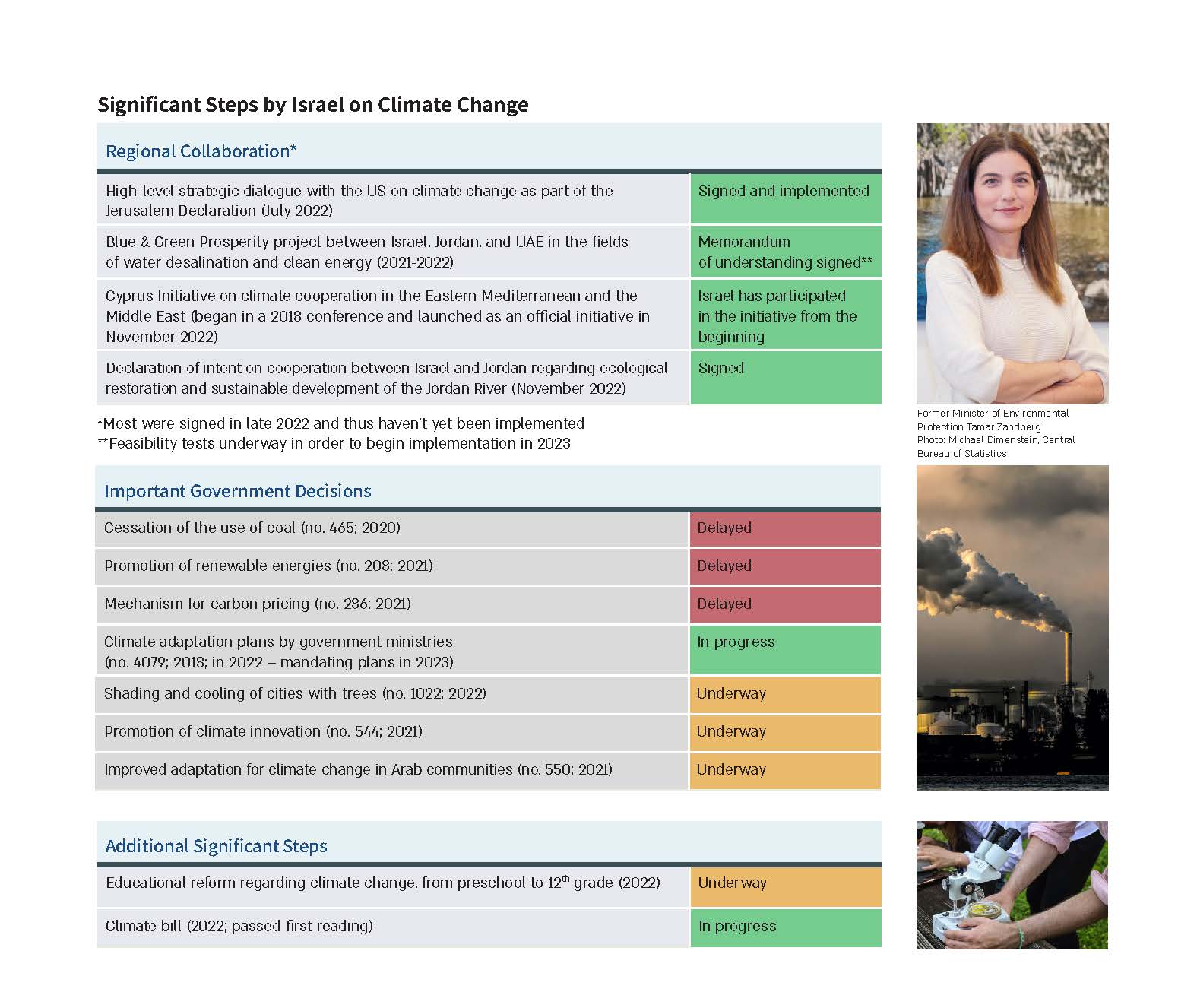
Despite Significant Progress, Gaps Remain
Despite significant Israeli progress on the climate front in 2022, substantial gaps remain. First, the implementation of important government decisions is delayed. Second, Israel is still one of two OECD countries without a climate law (the other is Turkey), and the version of the existing draft law sets unambitious targets and does not guarantee implementation. In the defense and national security establishment, climate is still not considered a core issue, and the security risks associated with climate change are poorly assessed. Furthermore, elements hostile to Israel as part of the BDS movement now connect the issue of climate justice and the Israeli-Palestinian conflict, posing a new diplomatic and legal front that must be addressed. In addition, of government investment in climate research and development (R&D) is relatively low compared to other industries, while unprecedented global investment challenges Israeli technological equity.
Recommendations
It is recommended that the State of Israel quickly implement existing government decisions, pass a meaningful climate law, align its commitments with the OECD average, assess the geopolitical risks associated with climate change, and work to contain their impact on Israel’s national security.
It is likewise recommended that the government adopt a similar strategy to that which made Israel a cyber power, in order to position the Israeli climatech industry at the global forefront. Israel should deepen its climate collaboration with international partners, such as the climate working group formed as part of the Israeli-US Strategic Partnership Joint Declaration signed in July 2022. Israel should also expand its climate cooperation with African countries, in light of the increased global attention to aiding this continent and the land bridge created by the normalization agreement with Sudan.
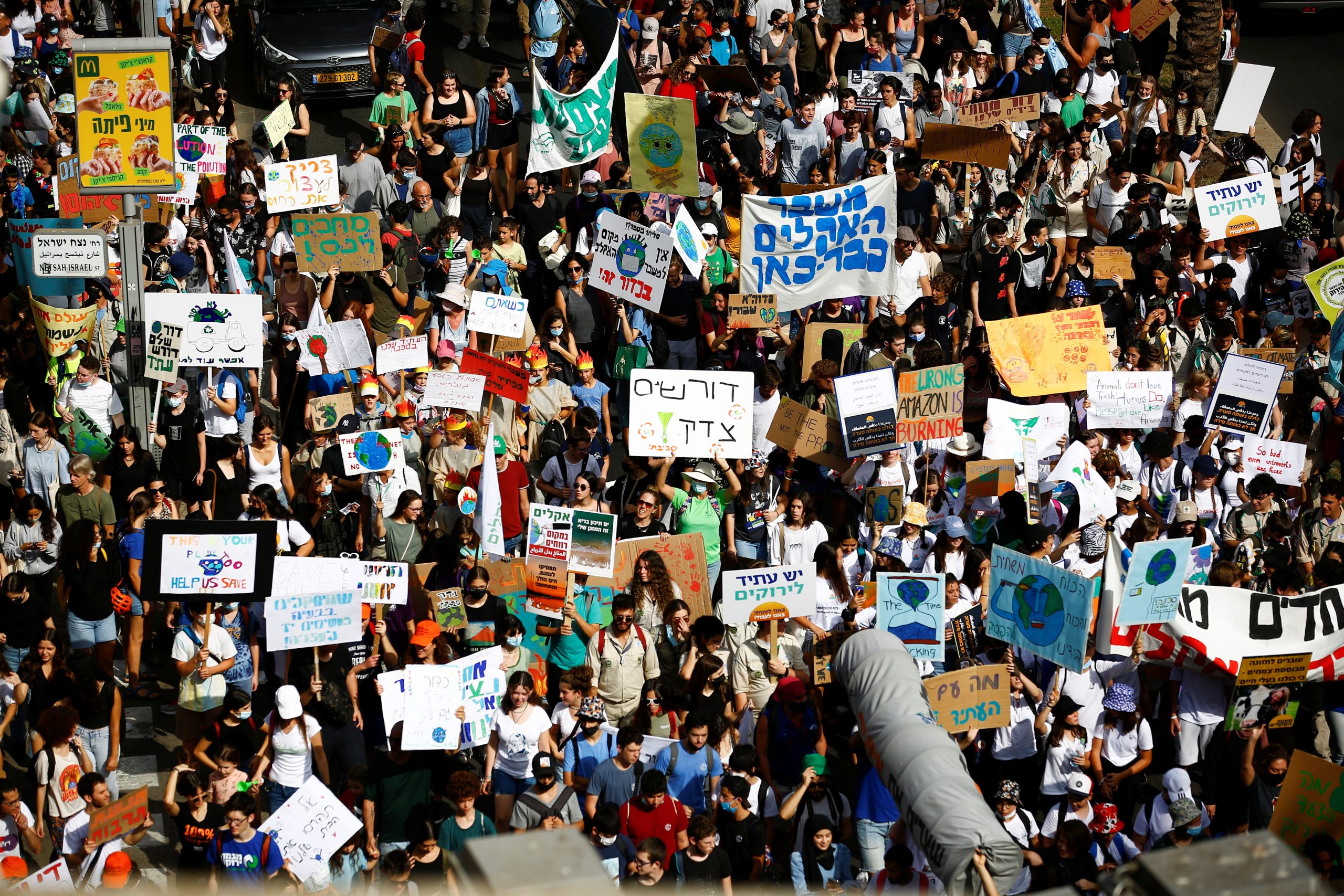
The State of Israel should implement existing government decisions quickly, and pass a meaningful climate law. Demonstration on climate crisis, Tel Aviv
Photo: REUTERS/Corinna Kern
The dates and location of COP27 in Egypt and COP28 in Dubai in November 2023, alongside geopolitical trends indicating that Middle East countries prefer diplomacy to conflict, could incentivize further collaboration between Israel and its neighbors in the fields of water and food security, energy, and climate change challenges, which would not only lead meaningful environmental strides but could also be leveraged for de-escalation and diplomacy. Therefore, it is recommended that Israel expand its collaboration with the Abraham Accords countries and with Jordan, Egypt, the Palestinians, and Turkey, and enlist the United States and European countries as sponsors and facilitators.
Possible areas for collaboration:
- Climate emergency response forum: Already today, regional countries (e.g., Israel, the Palestinian Authority, Turkey, Cyprus, Egypt, and Jordan) assist one another in extreme weather events, especially in battling forest fires. Considering the expected rise in the frequency and intensity of such events, this existing yet ad hoc cooperation can be institutionalized and expanded to additional partnerships. This framework can help develop organized and permanent mutual aid mechanisms, enable joint training and exercises, create a doctrine, pool resources, and procure joint assets (for example, a land and air firefighting fleet).
- Regional early warning systems for extreme weather events and linking together existing systems to analyze cross-border impacts. Such a system is also needed in the Gaza Strip, where early warning could help prevent harm to lives and property from floods.
- Regional cooperation to map and analyze the national security implications of climate change, focusing on threats to water and food security, heightened inter-group tensions, the creation of conducive conditions for the emergence of terrorist organizations and sub-state actors, undermining of governmental stability, and climate migration. For example, since 2008, some 21 million people have been forced to leave their homes each year as a result of extreme weather events, and the number could reach 1 billion by 2050. A targeted assessment of how climate migration could affect Israel’s borders is lacking.
- Based on the SESAME model (Synchrotron-light for Experimental Science and Applications in the Middle East) that was established in Jordan in 2017, which connects scientists from Israel, Iran, Turkey, Egypt, and Jordan, Israel can jointly initiate the establishment of a designated regional climate R&D center for coping with climate effects that are unique to the region, including water scarcity, desert agriculture, dust and sand storms, and solar energy for electrical infrastructure production.
- A regional food security initiative that would include R&D, knowledge exchange, joint diversification of food importing sources, financial cooperation in commodity markets, feasibility assessment of a regional grain trade center, and commitments to refrain from food export limitations and to provide aid in times of crisis.
The Digital Arena: Responding to the Challenge of Social Media
David Siman-Tov
In recent years, the digital arena has become a realm where societal and strategic phenomena are intensified, including rivalries, conflicts and wars, activity of non-state organizations, terrorism, and social protests. In the era of the democratization of information and fake news, social media have in effect become the town square for the rapid transfer of ideas and their transformation into social, cultural, and political movements. Social media connect individuals throughout the world, and at the same time forge polarization and divisions that weaken the state model and erode public confidence in the state. The world’s population, as such, is at once connected and alienated through the digital arena.

The world’s population is at once connected and alienated through the digital arena.
Photo: Shutterstock
States and malign non-state actors use internal political actors to intervene in democratic processes through improper (albeit legal) and at times commissioned use of social media. The violent discourse on the internet, which is rife with hate, lies, and incitement, threatens the political and social system and is essentially unfettered by legislation, ethics, and norms. The digital age thus creates conceptual and technological disruption and dramatically influences positions on leading national security issues.
The war in Ukraine has highlighted several processes and trends in the context of the digital arena:
- Social media serve as a main realm in the battle over the narrative, while enlisting civilians to take part in the campaign.
- Social media constitute a central source of open-source intelligence in real time; a considerable portion is attained by civilians.
- Influence operations in the war include cyber actions alongside the manipulation of content (fake news, deep fake).
- Digital platforms are an active player in the war.
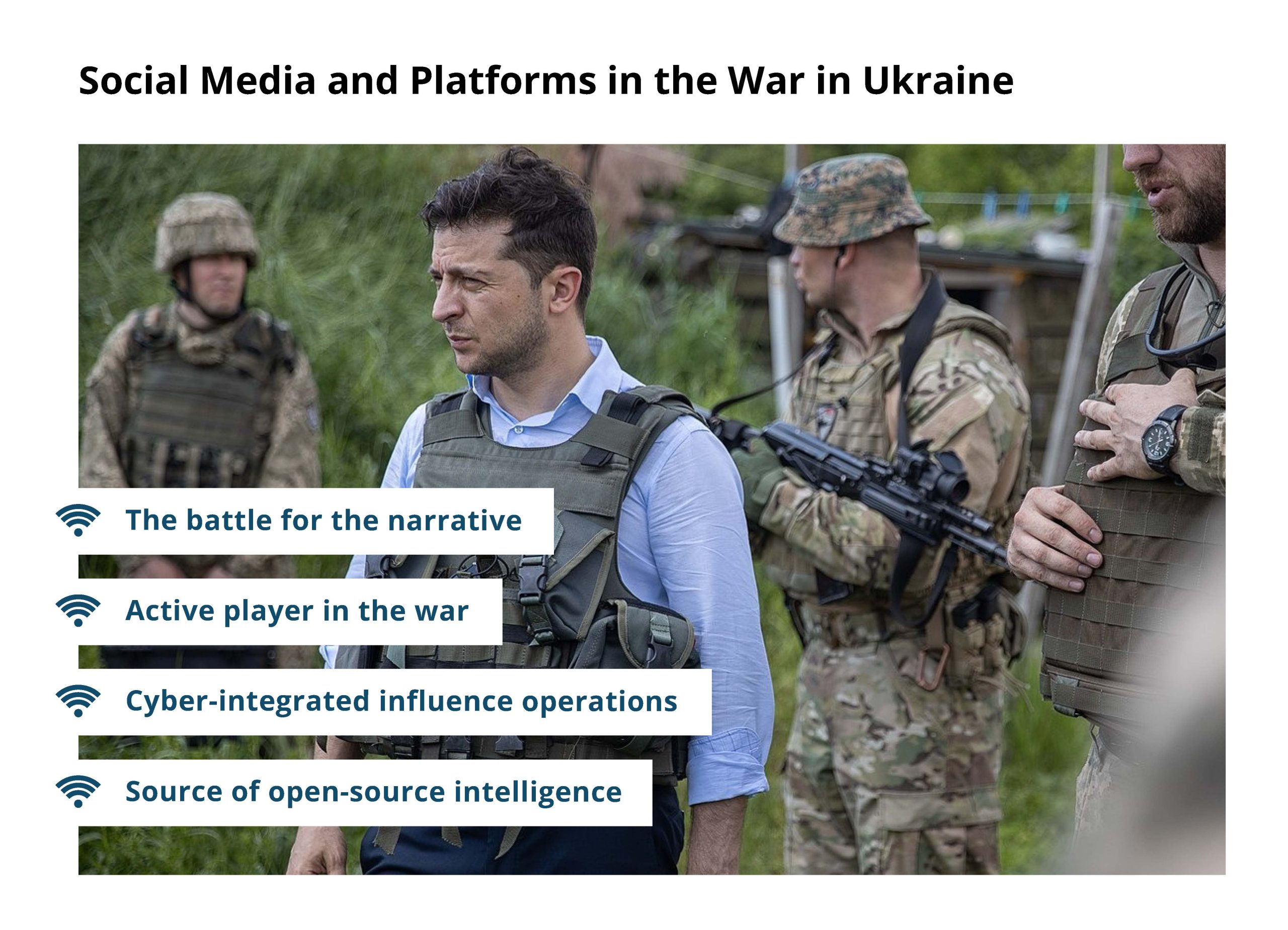
In the Israeli context, the terrorist attacks in Israel in the past year were abetted in part by incitement on the social media. Thus, the agitation and the escalation of violence that were evident in the latter part of 2022 in the northern West Bank were fomented by intensive activity on social media. Terrorist operatives became internet stars and clashes with the IDF were uploaded to the internet in real time. In tandem, antisemitic and anti-Israel elements make extensive use of the internet to erode Israel’s global standing and to increase the threat to Jewish communities, leveraging social media for these purposes.
Digital platforms are a basis for political subversion through foreign intervention in the internal discourse in Western countries, combining cyber operations with the manipulation of content. The goal is to exacerbate internal tensions in an effort to influence democratic processes and weaken states, undermine the ability of institutions to function, and upset the liberal idea. The Israeli political discourse is target of Iranian and other foreign intervention.
Social Media and National Security in Israel
Over the past decade Israel has seen significant progress in the cyber realm, organizationally (the establishment of the National Cyber Directorate and other relevant organizations in security and intelligence organizations), technologically, economically (Israel having become a hi-tech power that is a leader in the field of cyber defense), academically, and educationally. There has also been progress in the digital field – the National Digital Agency has been established and the idea of digital transformation is deemed an essential process both in the government sector and in the security establishment.
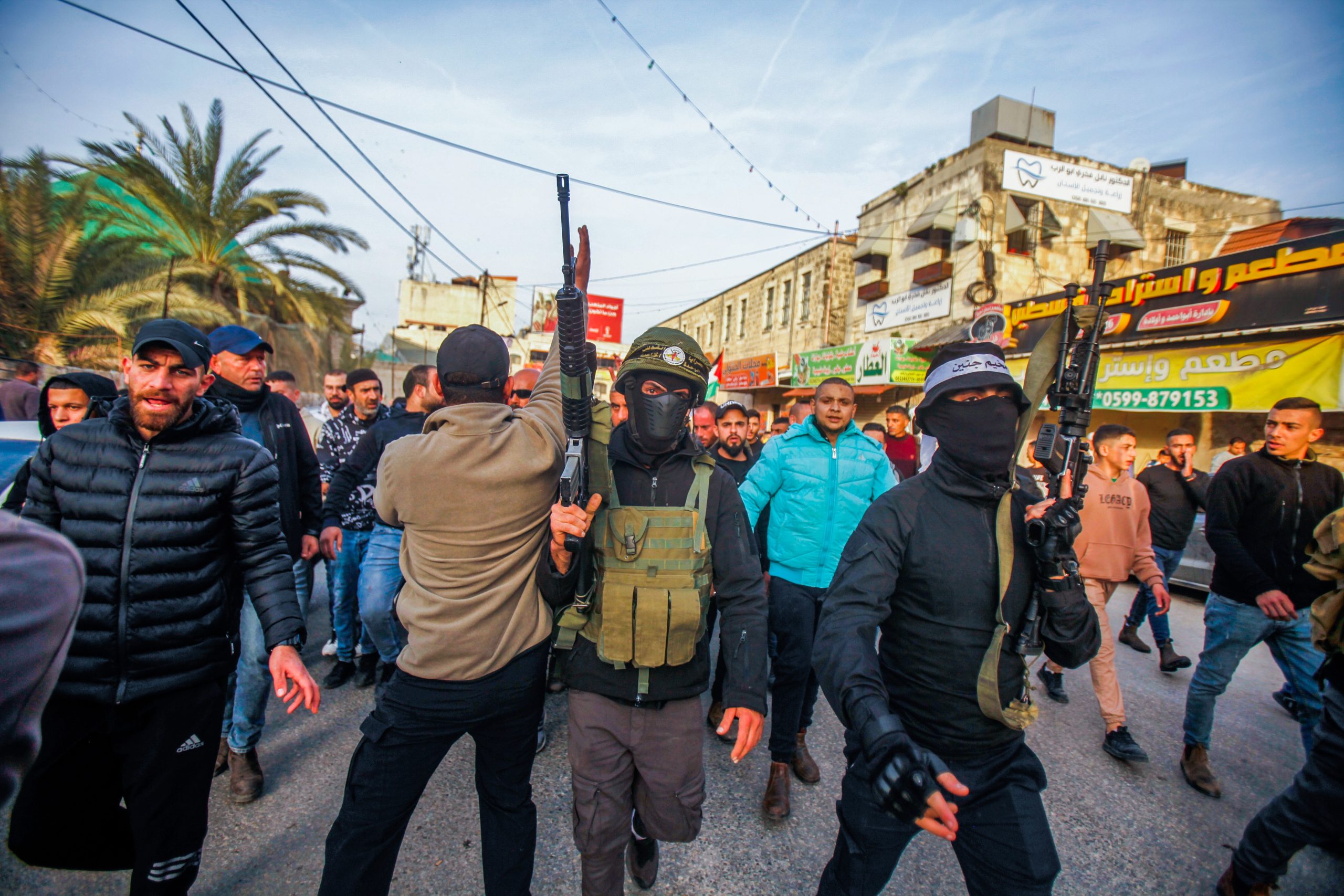
The agitation evident in the latter part of 2022 in the northern West Bank was fomented by intensive activity on social media. Clashes in Jenin
Photo: Nasser Ishtayeh / SOPA Images/Sipa USA
However, addressing the field of social media systemically from the perspective of national security is lacking in Israel. Among the reasons for this gap are the reluctance to curtail freedom of expression by supervising the internal Israeli discourse on social media and the difficulty of intelligence bodies to monitor social media, in part given the challenge of coping with global platforms that enjoy great power. These restraints are exploited by hostile actors, both external and internal, to advance subversive and problematic processes (even if they are partially legal).
The State Comptroller alluded to this gap and the lack of intelligence coverage regarding social media, and hence the unpreparedness of the security organizations for the riots that erupted in the cities with mixed Jewish and Arab populations during Operation Guardian of the Walls (2021). At the same time, it is difficult to distinguish between foreign influence (which is illegitimate) and internal discourse, which, while it is sometimes blunt and uninhibited, is part of the accepted rules of the political game.
Another aspect of the use of the digital realm is public diplomacy, which in social media is conducted by the Ministry of Foreign Affairs and the IDF Spokesperson’s Unit. Nevertheless, it appears that the potential of enlisting both the Israeli public and world Jewry in participating in the battle over the narrative, especially in times of emergency, is not realized
Recommendations for Israel
- Raise awareness in government ministries about threats and opportunities incurred by the digital era, prepare accordingly, and implement the recommendations of the committees that have worked on this issue in recent years.
- Regulate activity on digital platforms. It is necessary to advance legislation on digital platforms and enact regulation governing their legal activity in Israel, similar to other countries, in order to prevent the malign use of the internet (external or internal). In addition, a public council that would supervise social media should be considered.
- Enlist civil society groups in protecting the discourse from foreign and subversive intervention through the use of digital platforms. Engaging in the struggle includes: identifying a suspicious occurrence as not authentic, improving digital literacy of fake news on social media, and increasing public awareness of the threat.
- Increase intelligence work regarding social media. Just as there is an intelligence response to terrorism and incitement, so the work of all members of the intelligence community against the threat of foreign intervention in democratic processes must be reinforced.
- Increase the public diplomacy effort in the cognitive campaign. It is necessary to increase the investment of resources in digital platforms as part of digital diplomacy, while enlisting the Israeli and world public in times of war, between wars, and in the war against antisemitism.


